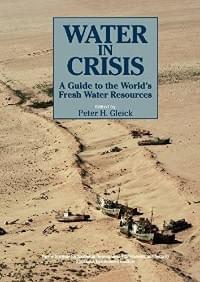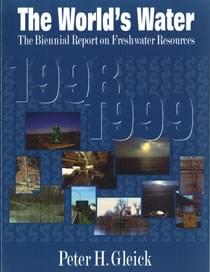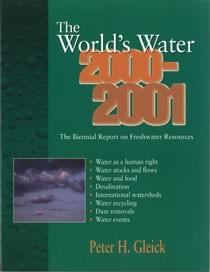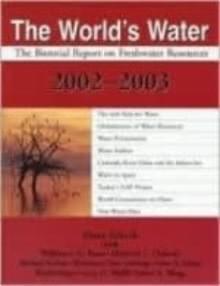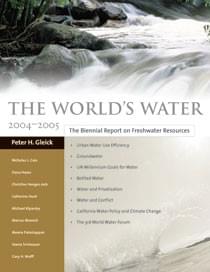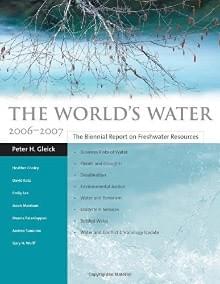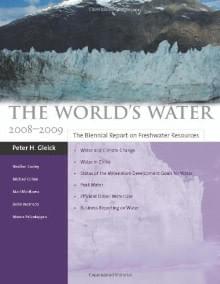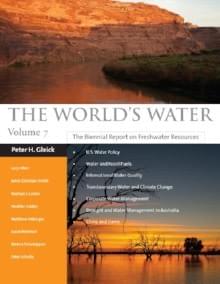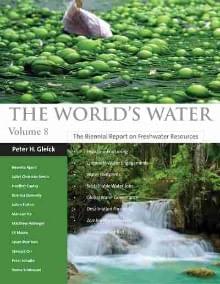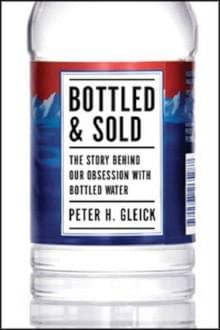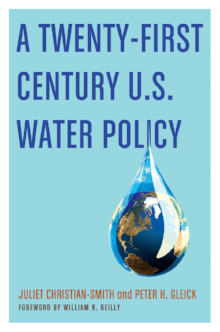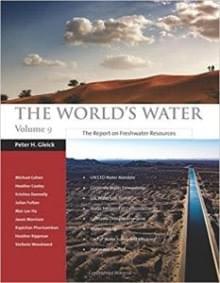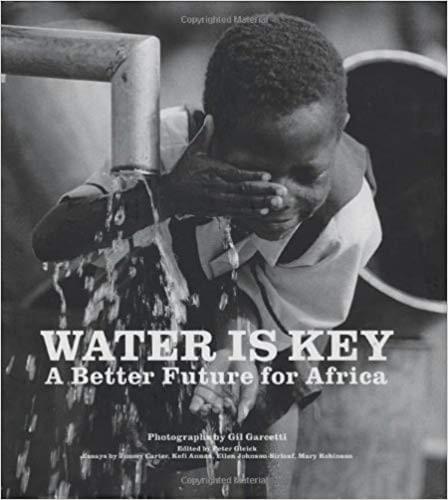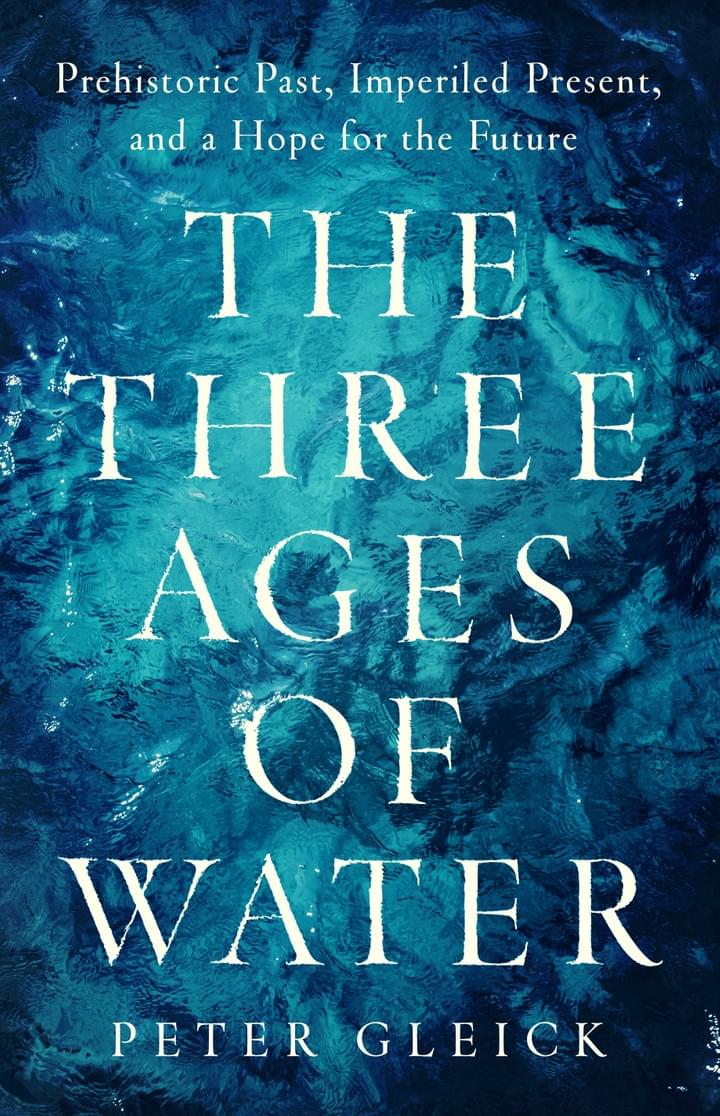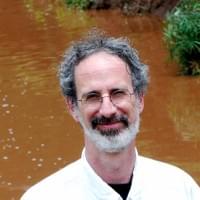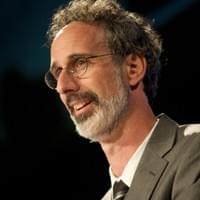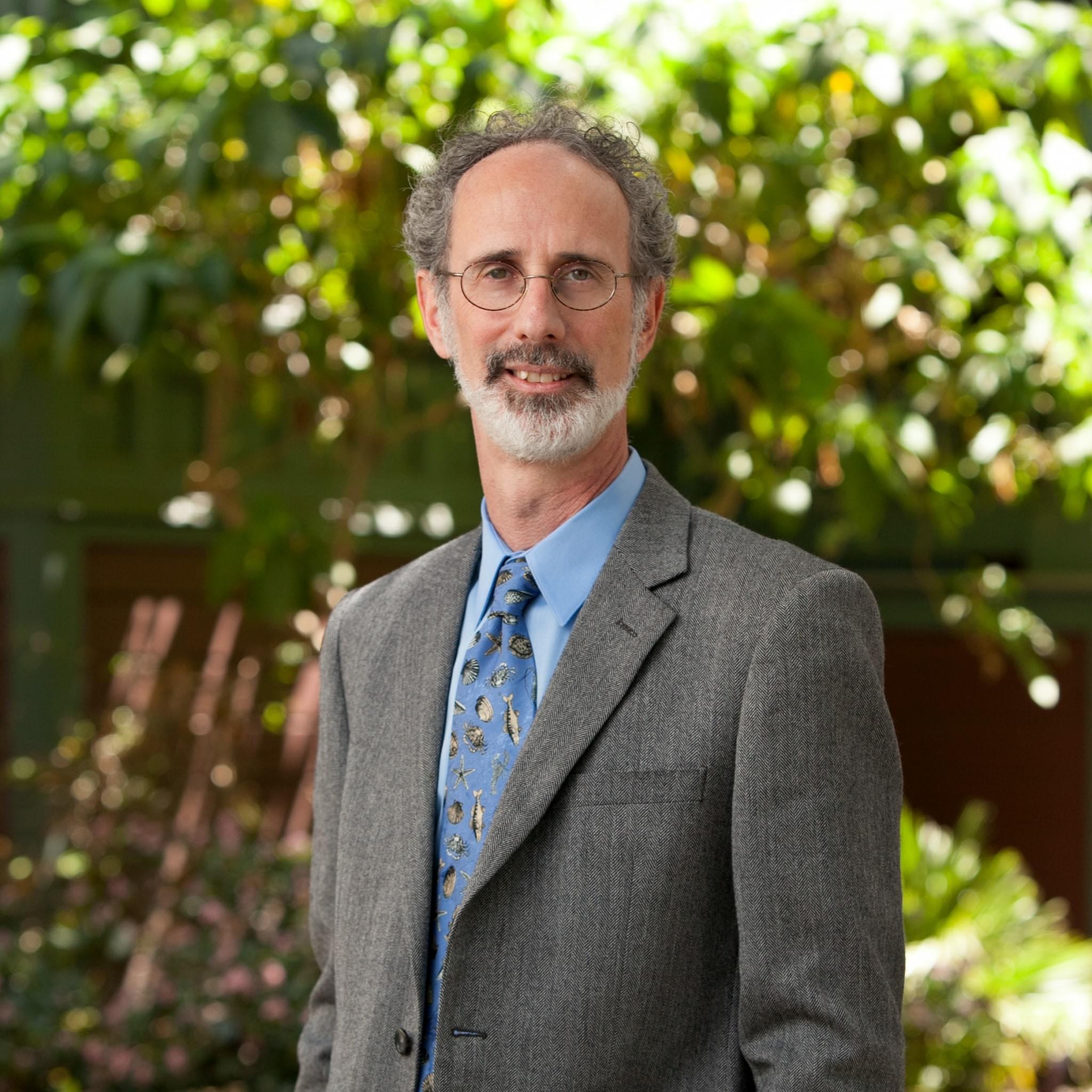

Peter H. Gleick
Water, Climate, Science Communication.

New!
The Three Ages of Water
Prehistoric Past, Imperiled Present, and a Hope for the Future
Bookshop.org
Amazon
Hachette Publishing
Apple Books
About
Dr. Peter Gleick is a leading scientist, innovator, and communicator on water and climate issues. He co-founded the Pacific Institute in Oakland,California in 1987, one of the most innovative, independent non-governmental research centers, creating and advancing solutions to the world’s most pressing water challenges. He is currently President-emeritus and Senior Fellow at the Institute. Dr. Gleick is a scientist trained at the intersection of hydrology, climatology, and policy. His work has redefined water from the realm of engineers to the world of social justice, sustainability, human rights, and integrated thinking. He developed one of the earliest analyses of the consequences of climate change for water resources, the earliest comprehensive work on water and conflict, and defined basic human needs for water and the human right to water – work that has been used by the United Nations and in human rights court cases. He pioneered the concept of the “soft path for water,” developed the idea of “peak water,” and has written about the history and background of the growing bottled water phenomenon.
Dr. Gleick is a MacArthur Fellow, an elected member of the U.S. National Academy of Sciences, the American Academy of Arts and Sciences, and a Fellow of the American Association for the Advancement of Science (AAAS). In 2018 he was awarded the Carl Sagan Prize for Science Popularization. He received his B.S. from Yale University and an M.S. and Ph.D. from the University of California, Berkeley. Dr. Gleick serves on the boards of numerous journals and organizations, and is the author or editor of many scientific papers and books, including the influential series The World’s Water; Bottled and Sold: The Story Behind Our Obsession with Bottled Water; and A Twenty-First Century U.S. Water Policy. His most recent book, The Three Ages of Water: Prehistoric Past, Imperiled Present, and a Hope forthe Future, was published in 2023 by PublicAffairs/Hachette.
Reviews of "The Three Ages of Water"
Bill McKibben, author The End of Nature
The honest name for our lovely blue planet probably should have been Water, since it covers most of the globe. And as Peter Gleick makes clear in this sweeping, unprecedented, and positively necessary new book, our chances for a workable future depend on how seriously we take the oceans, lakes, rivers, and aquifers that surround us--indeed, that fill our own cells. This book will change your outlook in deep and motivating ways.
Elizabeth Kolbert
Gleick lays out water's central role in human history and in our future. The Three Ages of Water is authoritative, far-ranging, and fascinating.
David Wallace-Wells
Amagnificent, mind-bending book. Water made us, Peter Gleick writes in his magisterial history and future of hydrology and the human planet. But what will we do to it, and what will we make of it, now? What we think of as the Anthropocene, and worry over as the coming of global warming, is in many mind-bending and demanding ways a crisis of water—though a soluble one. And there is no better guide to that crisis, or its solutions, than Gleick.
Greta Thunberg
What a wonderful book, congratulations! To understandwater is to understand ourselves, our origins, and what lies ahead for us. Peter Gleick tells the story of water in an accessible way that not only warns us about the dangers we are approaching, but also provides us with a vision for a hopeful future.Jerry Brown
At a time of fraught political divisions andintensifying environmental disruptions, Peter Gleick presents this timely and magisterial report on humankind’s use and misuse of water. He traces the incredible and varied ways water has been used from the earliest civilizations right up to our modern age. Unbelievable technical feats, he says, are now being overwhelmed by a changing climate and vast destruction of life-support systems. Humans now face, Gleick warns, a stark choice: grim, dystopian future or find a sustainable way to live with and manage water.
Gary White & Matt Damon, Co-founders of Water.org & WaterEquity
Gleick has delivered a book that provides a rich story of humanity’s interaction with water through a lens that helps us understand where we are today as we strive to balance all the demands we place on the planet’s water resources. His context of the past points to a future path that can ensure we strike this balance in a way that assures everyone has access to water as a basic human right. The additional payoff with the book is that it is accessible to all because of the way Gleick unfolds the story. It is a hopeful call to action grounded in fact, research, and analysis.Arizona Republic/USAToday: https://www.azcentral.com/story/news/local/arizona-environment/2023/06/14/peter-gleick-tells-the-story-of-water-and-its-power-over-people/70314554007/
A "comprehensive overview of humanity's relationship with water…across its 300 pages, he leaves no historical stone unturned…Gleick guides readers to a fork in the river of our future and explains what we will need to do to steer ourselves into the more sustainable, equitable channel.Climate Thoughts with Brian: https://climatewithbrian.com/2023/06/12/review-of-the-three-ages-of-water-by-peter-gleick/
engaging, detailed and yet wide-ranging, authoritative exploration of the relationship between humans and water and how a positive sustainable world is within our reach.Library Journal: https://www.libraryjournal.com/review/the-three-ages-of-water-prehistoric-past-imperiled-present-and-a-hope-for-the-future-1797947
Thorough, meticulous, and eminently readable…The author provides a global survey of water that is thorough and culturally and religiously balanced. Highly recommended for all libraries.Sierra Magazine: https://www.sierraclub.org/sierra/5-must-read-books-your-spring-reading-list
If there’s anything about water that’s not covered in Gleick’s book, it’s probably not worth knowing. From water’s origins following the Big Bang to its essential role in the development of life on Earth, the rise of human civilization, religion, public health, the legal system, and technology, to eminently workable ways of safeguarding this precious resource, it’s all contained in this magisterial read…Gleick provides a detailed plan that, if implemented, could not only avert disaster but also create a far more equitable, prosperous, and pleasant world for all creatures, not just the two-legged kind.Kirkus Reviews Books: https://www.kirkusreviews.com/book-reviews/peter-gleick/the-three-ages-of-water/
Gleick delivers a realistic solution…A well-documented book with more hard facts than usual but not more optimism.Next Big Idea Book Club June 2023 “Must Read:” https://nextbigideaclub.com/magazine/next-big-idea-clubs-june-2023-must-read-books/41978/
Booklist Reviews: https://www.booklistonline.com/The-Three-Ages-of-Water-Prehistoric-Past-Imperiled-Present-and-a-Hope-for-the-Future-/pid=9776675
Scientist Gleick buoyantly conveys just how special water is as a basic natural resource essential to survival, a predominant constituent of the human body (accounting for roughly 50–60 percent of an adult’s body weight), modeler of the environment, and major factor in human civilizations…An invaluable introduction to hydrology with crucial recommendations for managing the world’s water.Breakthroughs: https://nature.berkeley.edu/breakthroughs/briefs
The book chronicles the long and complex history of humanity's relationship with water, showing how rising human populations and growing pressure on natural resources have increased the risk of environmental collapse, driven massive economic inequality, and sown political conflict. But if we learn from the past, Gleick writes, we can create a positive future “with a balance between humans and nature, growing equality and social cohesion, and healthy, stable societies.”Covering Climate Now: https://coveringclimatenow.org/climate-beat-story/el-nino-fast-warming-oceans-climate-change/
One can’t talk about climate change without talking about water — and vice versa — writes Peter Gleick, one of the world’s great experts on the two subjects. This magisterial book points out that, as with climate change, humanity already possesses the know-how and technologies needed to solve its accelerating water crises.Curbed: New York Magazine. https://www.curbed.com/2023/06/the-8-best-new-design-and-architecture-books-out-this-summer.html
Gleick is a go-to for commentary on climate impacts like droughts and floods, and his most astonishing passages in this book reveal how water manages to wind its way into the center of virtually every societal conflict. It’s a timely read…but this is more than just a clear-eyed history of our most precious resource; it’s also a guide for how to better manage it in the future.Princeton Summer Reading recommendations. https://www.princeton.edu/news/2023/06/28/summer-reads-2023
Gleick has been well known in the water space for decades so this should be a good book. I often recommend his scientific journal articles to students who are new to the field as they are well-written and informative.The Revelator: https://therevelator.org/environmental-books-june2023/
For a more hopeful vision of water, check out The Three Ages of Water by Peter Gleick (and our interview with the author).Governing. https://www.governing.com/climate/theres-a-bipartisan-path-to-a-sustainable-water-future
In a new book, water scientist Peter Gleick traces the history of water and the ways it has been used and misused by humans. He makes the case that a sustainable water future is possible with the knowledge and technology we already have — if we choose to use it. [Together with an interview Q&A.]Science Magazine. https://www.science.org/doi/10.1126/science.adg9222
Peter Gleick’s The Three Ages of Water is a fascinating and timely examination of how water—both its abundance and its scarcity—has shaped human life and history. It is also an important call to protect existing water sources before they run dry that demonstrates what we can do to transition from an era defined by rampant water use to a more sustainable future. The Three Ages of Water provides a hopeful and practical vision for a more sustainable water future, one that supports human health, ecosystems, and economic development.Financial Times. https://www.ft.com/content/1abf0e6b-9cf7-4e78-aeeb-126d69a41430?accessToken=zwAF_8HzKJeAkc8avw5rnPdOeNOu6xJtaaQUMA.MEUCIQDBZJQa7Pc1BsIUS7PqC-Bn2n6K-YkB1nZP_NHmSoJ0HwIgY24Ft-4fGDuQv0hPOynnw51EQIaUGDtOEyoPf5fJPsk&sharetype=gift&token=8deee0e9-22ec-453c-b031-ac91afce9200
Peter Gleick offers an optimistic vision and manifesto for freshwater… timely additions to works of advocacy, explanation and imagination on the manifold interactions and accelerating crises in humanity’s relation to water.Future Essentials. https://mishadavinci.substack.com/p/the-future-of-work-money-learning?s=03
The book stretches from the Big Bang to our future path… Water has shaped the course of human history. It’s vital to our very existence. Yet most of us have no understanding of this precious resource. This book will change that.Ralph Lauren: The Summer Reading List. https://www.ralphlauren.com/rlmag/ralph-lauren-summer-reading-list-culture.html?ab=en_US_rlmag_hp_slot2
A book likely to be on the nightstand of someone you admire, it’s written by a recipient of the MacArthur Foundation “Genius Grant” and blurbed by Greta Thunberg, Matt Damon, and Bill McKibben. So, what’s it all about? Climate change, from the perspective of our ancient history with water itself. But rather than taking a doom-and-gloom approach, the story is focused on what we can do about it, charting a map for the future drawn from the lessons of the past.Nature Magazine. https://www.nature.com/articles/d41586-023-02241-0
With eloquence and practicality, [Gleick’s] essential book discusses the First Age of Water, from the Stone Age to the start of the modern era; the Second Age, of agricultural, industrial and technological revolutions; and the policies required for the Third Age, of sustainability, if civilization is to survive.ARY NEWS Pakistan. https://arynews.tv/three-ages-of-water/
‘The Three Ages Of Water’ by Peter Gleick is a warning on climate change with an emphasis on water… The author delivers a realistic solution…Maven’s Notebook. https://mavensnotebook.com/2023/07/02/daily-digest-holiday-weekend-edition-sjv-groundwater-agencies-scrambling-to-comply-with-sgma-leaving-some-landowners-in-the-lurch-how-this-year-ranks-among-the-all-time-biggest-rainfall-years-de/
Peter Gleick has spent years researching and writing about the crucial links between water, energy, food and health and the ramifications of climate change. His new book is an epic recounting of water’s history and management through time. And it’s a wake-up call as well, as he believes if we don’t fix our water management issues, a dystopian future awaits us.Great Lakes Now. https://www.greatlakesnow.org/2023/07/book-review-water-scientist-offers-positive-vision-avoid-dystopian-future/
The Three Ages of Water is a significant work on the critical topic of water. It’s historically rich and a scientifically accessible account of the water-human nexus over millennia, with a look at the future.Essays and Musings
May 2, 2025November 15, 2022April 5, 2021August 15, 2020April 21, 2020More PostsSelected Journal Articles
Gleick, P.H. 1977. "The power of nuclear fusion." Yale Scientific, Volume 51. No. 5. pp. 41‑45.
Gleick, P.H. 1981. "Health and safety effects of coal transportation: Reassessing the risks." Energy: The International Journal, Vol. 6, No. 7, pp. 611‑620. http://www.sciencedirect.com/science/article/pii/0360544281900165
Gleick, P.H. and Holdren, J.P. 1981. "Assessing environmental risks of energy." American Journal of Public Health, Vol. 71, No. 9. pp. 1046‑1050. http://www.ncbi.nlm.nih.gov/pmc/articles/PMC1619872/pdf/amjph00669-0072.pdf
Gleick, P.H. 1986. "Methods for evaluating the regional hydrologic impacts of global climatic changes." Journal of Hydrology, Vol. 88, pp. 97‑116.
Gleick, P.H. 1987a. "The development and testing of a water‑balance model for climate impact assessment: Modeling the Sacramento Basin." Water Resources Research, Vol. 23, No. 6, pp. 1049‑1061.
Gleick, P.H. 1987b. "Regional hydrologic consequences of increases in atmospheric carbon dioxide and other trace gases." Climatic Change, Vol. 10, No. 2, pp. 137‑161.
Gleick, P.H. 1988a. "The effects of future climatic changes on international water resources: The Colorado River, The United States, and Mexico." Policy Science, Vol. 21, pp. 23-39.
Gleick, P.H. 1988b. "The United States-Soviet 'Greenhouse/Glasnost' teleconference." Ambio, Vol. 17, No. 4, pp. 297-298.
Gleick, P.H. 1989a. "Greenhouse warming and international politics: Problems facing developing countries." Ambio, Vol. 18, No. 6, pp. 333-339.
Gleick, P.H. 1989b. "Climate changes and the Western United States: Impacts and responses." APCA Technical Paper 89-148.1. AWMA/APCA Annual Meeting, June 25-30, Anaheim, California.
Gleick, P.H. 1989c. "The implications of global climatic changes for international security."
Climatic Change, Vol. 15, No. 1/2, pp. 309-325.
Gleick, P.H. 1989d. "Climate change, hydrology, and water resources." Review of Geophysics, Vol. 27, No. 3. pp. 329-344.
Gleick, P.H. 1990. "Global climatic changes: A summary of regional hydrologic impacts." Civil Engineering Practice, Vol. 5, No. 1, pp. 53-68.
Gleick, P.H. 1990. "Global climatic change and international security," Colorado Journal of International Environmental Law and Policy, Vol. 1, No. 1, pp. 41-56.
Gleick, P.H. 1991a. "The vulnerability of runoff in the Nile basin to climatic changes." The Environmental Professional, Vol 13, pp. 66-73.
Gleick, P.H. 1991b. "Environment and security: The clear connections." Bulletin of the Atomic Scientists, Vol. 47, No. 3, pp. 16-21.
Nash, L.L. and P.H. Gleick. 1991. "The sensitivity of streamflow in the Colorado Basin to climatic changes." Journal of Hydrology, Vol. 125, pp. 221-241.
Gleick, P.H. 1992. "Environmental consequences of hydroelectric development: The role of facility size and type." Energy: The International Journal, Vol. 17, No. 8. Pergamon Press, Ltd., Great Britain, pp. 735-747.
Gleick, P.H. 1993. "Water and conflict." International Security, Vol. 18, No. 1, pp. 79-112 (Summer 1993).
Gleick, P.H. 1993. "Water resources: A long-range global evaluation." Ecology Law Quarterly, Vol. 20, No. 1, pp. 141-149.
Gleick, P.H. 1994. "Water, war, and peace in the Middle East." Environment, Vol. 36, No. 3, pp.6-on. Heldref Publishers, Washington.
Hatami, H. and Gleick, P. 1994. “Chronology of conflict over water in the legends, myths, and history of the Ancient Middle East.” In “Water, war, and peace in the Middle East.” Environment, Vol. 36, No. 3, pp.6–on. Heldref Publishers, Washington.
Gleick, P.H. 1994. "Water and energy." Annual Review of Energy and Environment, Vol. 19, pp. 267-299, Annual Reviews, Inc. Palo Alto, California.
Gleick, P.H., A. Rango, K. Cooley. 1994. "Evaluating climate change impacts in snowmelt basins." EOS, Transactions, American Geophysical Union, Vol. 75, No. 9, p. 107.
Gleick, P.H. 1996. "Basic water requirements for human activities: Meeting basic needs." Water International, Vol. 21, No. 2, pp. 83-92.
American Water Works Association (AWWA). 1997. Climate change and water resources. Journal of the American Water Works Association, Vol. 89, No. 11, pp. 107-110 (report of the Public Affairs Forum, by Gleick and others).
Gleick, P.H. 1998. “Water in crisis: Paths to sustainable water use.” Ecological Applications, Vol. 8, No. 3, pp. 571-579.
Postel, S.L., J.I. Morrison and P.H. Gleick. 1998. "Allocating fresh water to aquatic ecosystems: The case of the Colorado River Delta." Water International, Vol. 23, No. 3, pp. 119-125. http://dx.doi.org/10.1080/02508069808686757.
Gleick, P.H. 1999. “The human right to water.” Water Policy, Vol. 1, No. 5, pp. 487-503.
Gleick, P.H. and E.L. Chalecki. 1999. “The impacts of climatic changes for water resources of the Colorado and Sacramento-San Joaquin river basins.” Journal of the American Water Resources Association, Vol. 35, No. 6, pp.
Chalecki, E.L. and P.H. Gleick. 1999. “A framework of ordered climate effects on water resources: A comprehensive bibliography.” Journal of the American Water Resources Association, Vol. 35, No. 6, pp.
Gleick, P.H. 2000. “The changing water paradigm: A look at twenty-first century water resources development.” Water International, Vol. 25, No. 1, pp. 127-138.
Wong, A.K. and P.H. Gleick. 2000. “Overview to water recycling in California: Success stories.” Environmental Management and Health, Vol. 11, No. 3, pp. 216-238.
Gleick, P.H. 2001. “Making every drop count.” Scientific American, February, pp. 28-33.
Martindale, D. and P.H. Gleick. 2001. “How we can do it.” Scientific American, February, pp. 38-41.
Gleick, P.H. 2001. “Global water: Threats and challenges facing the United States. Issues for the new U.S. administration.” Environment, Vol. 43, No. 2, pp. 18-26.
Gleick, P.H. 2002. “Soft water paths.” Nature, Vol. 418, pp. 373. 25 July 2002.
Gleick, P.H. 2002. “Is the Skeptic all wet?” Environment, Vol. 44, No. 6, pp. 36-40.
Baron, J.S., N. LeRoy Poff, P.L. Angermeier, C.N. Dahm, P.H. Gleick, N.G. Hairston Jr., R.B. Jackson, C.A. Johnston, B.D. Richter, and A.D. Steinman. 2002. “Meeting ecological and societal needs for freshwater.” Ecological Applications, Vol. 12, No. 5, pp. 1247-1260.
Baron, J.S., N. LeRoy Poff, P.L. Angermeier, C.N. Dahm, P.H. Gleick, N.G. Hairston Jr., R.B. Jackson, C.A. Johnston, B.D. Richter, and A.D. Steinman. 2003. “Sustaining healthy freshwater ecosystems.” Issues in Ecology, No. 10, Winter 2003, Ecological Society of America.
Gleick, P.H. 2003. “Global freshwater resources: Soft-path solutions for the 21st century.” Science, Vol. 302, 28 November, pp. 1524-1528.
Gleick, P.H. 2003. “Water use.” Annual Review of Environment and Resources. Vol. 28, pp. 275-314.
Gleick, P.H. and J. Lane. 2005. “Large international water meetings: Time for a reappraisal.” Water International, Vol. 30, No. 3, pp. 410-414.
Kiparsky, M., C. Brooks, and P.H. Gleick. 2006. “Do regional disparities in research on climate and water influence adaptive capacity?” Climatic Change, Vol. 77, No. 3-4, pp. 363-375.
Gleick, P.H. 2006. “Ecosystem restoration challenges and opportunities.” Global Business and Development Law Journal, Volume 19, No. 1, pp. 1-11.
Gleick, P.H. 2006. “Water and terrorism.” Water Policy, Vol. 8, pp. 481-503.
Gleick, P.H. 2007. “El derecho humano al agua.” Economía Exterior. No. 41. Verano 2007.
Gleick, P.H. 2008. “Can California’s water problems be solved?” Ecology Law Currents. Volume 35, No. 2, pp. 71-79.
Gleick, P.H. 2008. “Why don’t we get more drinking water From desalinating the ocean?” Scientific American. Volume 299, No. 4, pp. 104.
Gleick, P.H. and H. S. Cooley. 2009. “Energy implications of bottled water.” Environ. Res. Lett. Vol. 4. doi:10.1088/1748-9326/4/1/014009.
Gleick, P.H. 2009. “Facing down the hydro-crisis.” World Policy Journal, Vol. XXVI, No. 4, pp. 17-24 (Winter 2009/2010.
Gleick, P.H. et al. ( with 255 members of US National Academy of Science). 2010. “Climate change and the integrity of science,” Science 7 May 2010, Vol. 328. no. 5979, pp. 689 – 690, DOI: 10.1126/science.328.5979.689.
Gleick, P.H. 2010. “Climate change, exponential curves, water resources, and unprecedented threats to humanity.” Climatic Change, Vol. 100, No. 1. pp. 125-129. doi:10.1007/s10584-010-9831-8.
Gleick, P.H. and M. Palaniappan. 2010. “Peak water: Conceptual and practical limits to freshwater withdrawal and use." Proceedings of the National Academy of Sciences (PNAS), Vol. 107, No. 25, pp. 11155–11162 Washington, D.C. June 22, 2010. www.pnas.org/cgi/doi/10.1073/pnas.1004812107.
Gleick, P.H. 2010. "Roadmap for sustainable water resources in the southwestern North America." Proceedings of the National Academy of Sciences (PNAS), Vol. 107 No. 50, pp. 21300-21305 Washington, D.C. December 14, 2010
Cooley, H. and P.H. Gleick. 2011. "Climate-proofing transboundary water agreements." Hydrological Sciences Journal, Vol. 56, No. 4, pp. 711–718.
Heberger, M., H. Cooley, P. Herrera, P. H. Gleick, E. Moore. 2011. Potential impacts of increased coastal flooding in California due to sea-level rise. Climatic Change. Doi:10.1007/s10584-011-0308-1.
Gleick, P.H., J. Christian-Smith, H. Cooley. 2011. Water-use efficiency and productivity: rethinking the basin approach. Water International, Vol. 36, No. 7, pp. 784-798. http://dx.doi.org/10.1080/02508060.2011.631873.
DeFries, R.S., E.C. Ellis, F.S. Chapin III, P.A. Matson, B.L. Turner II, A. Agrawal, P.J. Crutzen, C. Field, P. Gleick, P.M. Kareiva, E. Lambin, D.Liverman, E. Ostrom, P.A. Sanchez, and J. Syvitski. 2012. Contract for global change science to contribute to a sustainable future. BioScience, Vol. 62, pp. 603–606. Doi:10.1525/bio.2012.62.6.11.
Gleick, P.H. 2013. A drop in the bucket. Finance & Development, Vol. 50, No. 3. International Monetary Fund. http://www.imf.org/external/pubs/ft/fandd/2013/09/Gleick.htm
Gleick, P.H. 2014. Water, drought, climate change, and conflict in Syria. Weather, Climate, and Society. Vol. 6, No. 3, pp. 331-340. American Meteorological Society. http://dx.doi.org/10.1175/WCAS-D-13-00059.1
Christian-Smith, J., M. Levy, P. Gleick. 2014. Maladaptation to drought: a case report from California, USA. Sustainability Science, p. 1-11. http://dx.doi.org/10.1007/s11625-014-0269-1
Fulton, J., H. Cooley, P.H. Gleick. 2014. Water footprint outcomes and policy relevance change with scale considered: Evidence from California. Water Resources Management, Vol. 28, Issue 11, pp. 3637-3649, Springer, Netherlands. http://dx.doi.org/10.1007/s11269-014-0692-1.
Liu, J. H. Mooney, V. Hull, S.J. Davis, J. Gaskell, T.Hertel, J. Lubchenco, K.C. Seto, P.H. Gleick, C. Kremen, S. Li. 2015. Systems integration for global sustainability. Science, Vol. 347, No. 6225. 27 February 2015. DOI: 10.1126/science.1258832Mann, M.E. and P.H. Gleick. 2015. Climate change and California drought in the 21st century. Proceedings of the National Academy of Sciences (PNAS), Vol. 112, No. 13. pp. 3858–3859. www.pnas.org/cgi/doi/10.1073/pnas.1503667112.
Gleick, P.H. 2015. On methods for assessing water-resource risks and vulnerabilities. Environ. Res. Lett. 10, 111003. doi:10.1088/1748-9326/10/11/111003
Gleick, P.H. 2016. Water strategies for the next administration. Science. Vol. 354, Issue 6312, pp.555-556Gleick, P.H. 2017. Climate, water, and conflict: Commentary on Selby et al. 2017. Political Geography, Vol. 60, pp. 248-250.
Lui, J., V. Hull, H. Charles, J. Godfray, D. Tilman, P. Gleick, H. Hoff, C. Pahl-Wostl, Z. Xu, M.G. Chung, J. Sun, and S. Li. 2018. Nexus approaches to global sustainable development. Nature Sustainability, Vol. 1, pp. 466-476. (September 2018), https://doi.org/10.1038/s41893-018-0135-8.
Cooley, H., R. Phurisamban, P.H. Gleick. 2019. The cost of alternative urban water supply and efficiency options in California. Environmental Research Communications, Vol. 1, Issue 4. http://dx.doi.org/10.1088/2515-7620/ab22ca
Gleick, P.H. 2019. Water as a weapon and casualty of conflict: Freshwater and international humanitarian law. Water Resources Management. Springer.
https://doi.org/10.1007/s11269-019-02212-z
Gleick, P.H. 2019. Water as a weapon and casualty of armed conflict: A review of recent water-related
violence in Iraq, Syria, and Yemen. WIREs Water. 1–15.https://doi.org/10.1002/wat2.1351
Gleick, P.H. 2020. The Martian Water War: Notes Found in an Airlock. The Magazine of Fantasy & Science Fiction. Sept/Oct 2020, pp. 150-155.
https://doi.org/10.1146/annurev-environ-012220-101319
Falk, J., Colwell, R., El-Beltagy, A., Gleick, P.H. et al. 2021. Beyond 2020: converging crises demand integrated responses. Sustainability Science 16, 691–693 (2021).
https://doi.org/10.1007/s11625-020-00876-w
Falk, J., Colwell, R., Behera, S.K., El-Beltagy, A.S., Gleick, P.H., Kennel, C.F., Lee, Y.T., et al. 2022. "An urgent need for COP27: confronting converging crises." Sustainability Science, 1-5. https://link.springer.com/article/10.1007/s11625-022-01253-5
Falk, Jim, Attig-Bahar, F., Colwell, R.R., Behera, S.K., El-Beltagy, A.S., von Braun, J., Dasgupta, P., Gleick, P.H., et al. 2022. "Addressing our planetary crisis." Sustainability Science 17, no. 1: 5-7. https://link.springer.com/article/10.1007/s11625-021-01059-x
Gleick, P.H. and M. Shimabuku. 2023. Water-related conflicts: Definitions, data, and trends from the Water Conflict Chronology. Environmental Research Letters.
https://doi.org/10.1088/1748-9326/acbb8f.
Shumilova, O. et al., 2023. Impact of the Russia-Ukraine armed conflict on water resources and water infrastructure. Nature Sustainability.
https://www.nature.com/articles/s41893-023-01068-x
Gleick, P.H. 2023. Moving to a sustainable future for water. Nature Water. https://doi.org/10.1038/s44221-023-00091-8
Vyshnevskyi, V., S. Shevchuk, V. Komorin, Y. Oleynik, and P. Gleick. 2023. The destruction
of the Kakhovka dam and its consequences. Water International. https://doi.org/10.1080/02508060.2023.2247679
Podcasts and Recordings
The Four Top: Wine News and Culture. “Episode 122: Gray Water for Green Vineyards.” July 12, 2023. https://www.spreaker.com/user/11314936/thefourtop-s4-e3-final
Something You Should Know, with Mike Carruthers. June 26, 2023. https://www.somethingyoushouldknow.net/908-what-makes-things-funny-really-interesting-facts-you-didnt-know-about-water/
Lawfare, Chatter. June 15, 2023. https://shows.acast.com/chatter/episodes/water-security-and-conflict-with-peter-gleick
KQED Forum with Alexis Madrigal. June 26, 2023. https://www.kqed.org/forum/2010101893514/peter-gleick-on-the-history-and-uncertain-future-of-the-worlds-water
ClimateOne/Commonwealth Club, San Francisco. "The Three Ages of Water." June 12, 2023. https://www.youtube.com/watch?v=IB7667K5Z4I
“The Future of Water.” The Revelator, with Tara Lohan. June 12, 2023. https://therevelator.org/gleick-water/
LitHub interview. June 8, 2023. https://lithub.com/peter-gleick-on-the-prehistoric-past-imperiled-present-and-hopeful-future-of-water/ ; also https://lithub.com/26-new-books-out-today-2/
“The Three Ages of Water.” Keen On Podcast with Andrew Keen. June 8, 2023. https://www.listennotes.com/podcasts/keen-on/the-three-ages-of-water-zINH8xgertV/
“A path out of the water crisis.” The Climate Pod. June 7, 2023. https://theclimatepod.libsyn.com/a-path-out-of-the-water-crisis-w-dr-peter-gleick
Thom Hartmann Show. June 6, 2023. https://thom.tv/p/audio-and-video-podcasts-tuesday-0d4#details
What Matters Water TV + Podcast, the Southern California Water Coalition with Charlie Wilson. May 30, 2023. https://socalwater.org/12-peter-gleick-three-ages-of-water/
“Too Much Water for California.” Today Explained, Vox. January 12, 2023. https://open.spotify.com/episode/7vYyvZpmpYCYXlPwB4jqix?si=7a071e5d8c1f4974&nd=1
“What about Water? with Jay Famiglietti. Engineering a New World. July 13, 2022. https://www.listennotes.com/podcasts/what-about-water-with-jay-famiglietti-qG6oO4u0XCZ/
Flightless Bird: Bottled Water with Peter Gleick and David Farrier. July 12, 2022. https://www.listennotes.com/podcasts/armchair-expert/flightless-bird-bottled-water-5irnzwF4mex/
“Water Wars: Whose water is it anyway?: Past Forward. American Experience. PBS. May 12, 2022. https://www.youtube.com/watch?v=lPaHpAZzUEA
The Water Zone: The War for Water, with Peter Gleick and Travis Loop. April 21, 2022. https://www.listennotes.com/podcasts/the-water-zone/the-war-for-water-0MCglrw5Ioj/
waterloop #137. The Chronology of Conflict with Peter Gleick. March 29, 2022. https://www.listennotes.com/podcasts/waterloop/waterloop-137-the-chronology-Otc63sAUN_G/
Mark Thompson Show Podcast, with Peter Gleick. January 17, 2022. https://www.listennotes.com/podcasts/the-mark-thompson/january-17-2022-mark-A6qZGy3tDkY/
January 6th Revisited w/Danny Sjursen, and Peter Gleick on Florida’s water. JENerational Change.
January 15, 2022. https://www.listennotes.com/podcasts/jenerational-change/january-6th-revisited-w-sPNGUo7yhRa/“Hydropocalypse Now.” Doomsday Watch with Arthur Snell. December 2021. https://open.spotify.com/episode/14MyvopIIo9MPwVqBWk4Un
“Water Cycle w/ guest Peter Gleick.” The Climate Crisis Podcast. November 1, 2021. https://www.listennotes.com/podcasts/the-climate-crisis/water-cycle-w-guest-peter-hgwS0PWIQ2L/
Yahoo The Climate Crisis Podcast: Scientists express doubt that Glasgow climate change conference will be successful. October 28, 2021. https://news.yahoo.com/scientists-express-doubt-that-glasgow-climate-change-conference-will-be-successful-090020695.html
“Episode 1: The Importance of Water Data, with Peter Gleick.” The Water Data Podcast, August 30, 2021. https://www.listennotes.com/podcasts/the-water-data/episode-1-the-importance-of-aNPb6HV9Wo-/
Gastropod: The Bottle vs. Tap Battle Finale: Alkaline H2O, LeadPipes, and, Yes, Water Sommeliers. July 20, 2021. (43:35 min). https://gastropod.com/the-bottle-vs-tap-battle-finale-alkaline-h2o-lead-pipes-and-yes-water-sommeliers/
Gastropod: Bottled Vs. Tap: The Battle to Quench Our Thirst. July 6, 2021. (42:06 min). https://gastropod.com/bottled-vs-tap-the-battle-to-quench-our-thirst/
“Learning to Live in a Drier California.” KCBS Radio In Depth. May 22, 2021. https://www.listennotes.com/podcasts/kcbs-radio-in-depth/learning-to-live-in-a-drier-cn_SlMjF89z/
“Bide(n)time for America’s Water Resources with Peter Gleick.” What About Water? Podcast with Jay Famiglietti. November 8, 2020. https://open.spotify.com/episode/2jqOsHihQWKt0xPEQiq1pC
“How climate change is contributing to Western wildfires.” KCPW: In the Hive podcast with Roger McDonough. September 16, 2020. https://kcpw.org/blog/in-the-hive/2020-09-16/climate-fires/
“California wildfires and climatechange.” CBC Radio, The Current podcast. Sept. 11, 2020. https://www.listennotes.com/podcasts/the-current/california-wildfires-and-8BNpaM0k9QE/
“Adapting to a Drier Planet.” Foreign Policy: Heat of the Moment podcast. June 10, 2020. https://www.listennotes.com/podcasts/heat-of-the-moment/adapting-to-a-drier-planet-QK860tH4IT9/
The End of History Podcast: Ep 218 : Water Scarcity Contributes to Conflicts. January 10, 2020. (19:48 min). https://web.archive.org/web/20210227222357/http://www.theendofhistory.net/important_stories_christians_need_to_know/ep-218-water-scarcity-creates-conflicts-interview-with-dr-peter-gleick/
“Speaking Of Water With Peter Gleick – California Drinking Water Bill.” Circle of Blue podcast. 2019. https://www.circleofblue.org/2019/california/speakingofwatercaliforniadrinkingwater/
“Examining The Water Crisis (w/Dr. Peter Gleick of Pacific Institute).” The Climate Pod. July 31, 2019. https://www.listennotes.com/podcasts/the-climate-pod/examining-the-water-crisis-w--0ovnBJHLrS/
Circle of Blue: Speaking of Water:Water and Conflict: The Pacific Institute's Water Conflict Chronology. June 18,
2018. (21 min) https://www.circleofblue.org/2018/world/whats-up-with-water-speaking-of-water-water-conflict-chronology/“Countdown to Day Zero.” Vox Media Podcast Network. Today Explained podcast. Feb. 22, 2018. https://www.listennotes.com/podcasts/today-explained/countdown-to-day-zero-BJ-xcnl9Gsv/
“The Droplet: Una obra para hablar delproblema del agua.” Mundociencia. November 24, 2017. https://www.listennotes.com/podcasts/mundo-ciencia/the-droplet-una-obra-para-1TyhL8Jpx9e/
“How will the White House respond to new climate report?” Minnesota Public Radio. The Takeaway.
August 8, 2017. https://www.mprnews.org/story/2017/08/08/will-trump-act-climate-change-report“Is it Time to Ban the Plastic Bottle?” BBC News: The Inquiry. July 23, 2017. https://www.bbc.co.uk/programmes/p058jgyr
Circle of Blue Water News. The Water Conflict Chronology. Water Conflicts over Centuries and Millennia.
June 22, 2017. https://www.listennotes.com/podcasts/circle-of-blue/the-water-conflict-6fwJdWrVz8g/“Weather whiplash in California.” Minnesota Public Radio, Climate Cast. May 25, 2017. https://www.listennotes.com/podcasts/climate-cast-minnesota-public-radio-8J_dhjZy0fE/
GreenBiz: Video Interview at Verge 16:'Water Guru' Peter Gleick on the new role of business. August 30, 2016. (4:32
min) https://www.greenbiz.com/video/water-guru-peter-gleick-new-role-businessClimate One/CommonwealthClub. Is California Entering a Megadrought? with Peter Gleick, Noah
Diffenbaugh, Karen Ross. August 5, 2016. https://www.listennotes.com/podcasts/climate-one/is-california-entering-a-qFeGZLwURCD/Iowa Public Radio: Iowa's Drinking Water: Could Flint Happen Here? June 17, 2016. (44:58 min) https://www.iowapublicradio.org/post/iowas-drinking-water-could-flint-happen-here#stream/0
Ikonokast with Greg Laden: Episode 3 –California Drought and Syrian Refugee Crisis with Dr. Peter Gleick. February
13, 2016. (42:48 min) http://ikonokast.com/2016/02/13/episode-3-california-drought-and-syrian-refugee-crisis-with-dr-peter-gleick/“The Conversation, Episode 64- Peter Gleick.” The Conversation: In Search of the New Normal. February 13,
2016. https://podcasts.apple.com/us/podcast/the-conversation-64-peter-gleick/id527129230?i=100036285871799 Percent Invisible: Episode 188: Fountain Drinks with Peter Gleick. November 10, 2015. (35:16 min) https://99percentinvisible.org/episode/fountain-drinks/
“The Water Whisperer: Peter Gleick.” The Edge with Mark Thompson. September 2015.
“Conversation with PeterGleick.” Freshwater Trust Podcast. February 19, 2014. https://www.thefreshwatertrust.org/freshwater-talk-episode-7-dr-peter-gleick-pacific-institute/
Climate Cast, Minnesota Public Radio. How Climate Change will Impact Water Quality, Sustainability. August
30, 2015. https://www.listennotes.com/podcasts/climate-cast/how-climage-change-will-X0S4xBbq3Mm/Humanosphere Podcast. Water’s critical role in the fight against poverty: Peter Gleick. August 24, 2015. https://www.humanosphere.org/podcasts/2015/08/waters-critical-role-in-thefight-against-poverty-peter-gleick/
On Shifting Ground, World Affairs Council. Peter Gleick: Not a Drop to Drink: Dealing with Drought. July
16, 2015. https://www.listennotes.com/podcasts/on-shifting-ground/peter-gleick-not-a-drop-to-trg0Iu7McD3/KVPR: Valley Public Radio: California Reservoirs at the "Bottom Of The Barrel." March 20, 2015. (1:04 min) https://www.kvpr.org/post/peter-gleick-california-reservoirs-bottom-barrel
Climate One/Commonwealth Club. Chasing Water with Brian Richter, Peter Gleick, Brooke Barton. October
28, 2014. https://www.listennotes.com/podcasts/climate-one/chasing-water-102814-ifXe5nWKtzB/Sea Change Radio: Parched: California Drought Update. September 3, 2014. (28:51 min) https://www.3blmedia.com/News/Parched-California-Drought-Update
BBC News: Business Daily: The End of the Era of Cheap Water. August 7, 2014. (18 min) https://www.bbc.co.uk/programmes/p023xfl8
Freshwater Talk Podcast, Freshwater Trust. Dr. Peter Gleick/Pacific Institute. February 19, 2014. https://www.thefreshwatertrust.org/freshwater-talk-episode-7-dr-peter-gleick-pacific-institute/
Protecting the World’s Water Resources, with Peter Gleick. IMF Podcasts. October 24, 2013. https://www.listennotes.com/podcasts/imf-podcasts/protecting-the-worlds-water-MepD_ZAS6Na/
Global development podcast: Water, water everywhere? The Guardian. March 22, 2013. John Vidal discusses the pressure on one of the world's most precious resources with Catarina de Albuquerque, Timeyin Uwejamomere, Dr Peter Gleick and Thierry
Mallet. https://www.theguardian.com/global-development/audio/2013/mar/22/global-development-podcast-waterIn Deep with Angie Coiro. Last Call at the Oasis with Peter Gleick. November 26, 2012. https://www.listennotes.com/podcasts/in-deep-with-angie/last-call-at-the-oasis-GJOyMzguSK1/
The Commonwealth Club, San Francisco: The Future of Our Water - Can We Learn From The Past? September 13, 2012. (61:48
min) https://www.commonwealthclub.org/events/archive/podcast/peter-gleick-future-our-water-can-we-learn-past-91312“Peter Gleick On the Impact of Our Bottled Water Obsession.” Mark Dowie: On the Fly Podcast. March 30, 2011. https://www.guernicamag.com/mark_dowie_on_the_fly_podcast_2/
The Climate Show, New Zealand: Peter Gleick, the AGU, and climate sensitivity. December 19, 2010. (1:26:33 min) https://www.youtube.com/watch?v=GlNYUrXFLNg
Mind Over Matter: KEXP with Diane Horn: Sustainability Segments: Peter Gleick. October 11, 2010. https://kexp.org/podcasts/mind-over-matters-sustainability-segment/2010/10/11/
“Environmental Sustainability and Water Supply with Peter Gleick.” Stanford Social Innovation Review” Inside Social Innovation
podcast. September 15, 2010. https://ssir.org/podcasts/entry/environmental_sustainabililty_and_water_supplyFresh Air with Terry Gross. NPR. War On Tap: America's Obsession With Bottled Water with Peter Gleick. May 17, 2010.
https://www.npr.org/2010/05/17/126833795/war-on-tap-americas-obsession-with-bottled-waterPRI The World with Marco Werman: China's dirty water problem. February 11, 2010. (4:36 min) https://www.pri.org/stories/2010-02-11/chinas-dirty-water-problem
On Shifting Ground, World Affairs Council with Ray Suarez. From Peak Oil to Peak Water: The Impending World Water
Crisis with Peter Gleick. February 4,2010. https://www.listennotes.com/podcasts/on-shifting-ground/from-peak-oil-to-peak-water-4JgXTSxRplA/Fresh Air with Terry Gross. NPR. Peter Gleick Reports on a Looming Water Crisis. November 27, 2007. https://thisisfreshair.org/segments/peter-gleick-reports-looming-water-crisis
American Rivers. H2O Podcast. AR02. Sustainable River and Freshwater Management, with Peter Gleick and Andrew
Fahlund. October 1, 2006. https://www.listennotes.com/podcasts/water-environment/ar02-sustainable-river-and-XyKmYloTQ85/Quotes
“…the most important environmental liability of oil as an energy source is probably not air pollution or oil spills but the chance that war will be waged over access to the world's remaining supplies. The most important environmental liability of coal is not the occupational toll of mining or the public toll from coal-transport accidents …or the direct damage to public health from airborne sulfates… rather it is the threat of global climate change posed by accumulating atmospheric carbon dioxide, the consequences of which …are potentially enormous but highly resistant to convincing quantification. The most important environmental liability of nuclear fission is neither the routine nor accidental emissions of radioactivity, but the deliberate misuse of nuclear facilities and materials for acts of terrorism and war.”
[P.H. Gleick and J.P. Holdren. 1981. “Assessing Environmental Risks of Energy.” American Journal of Public Health, Vol. 71, No. 9, pp. 1046-1050 (September 1981).]
"One of the most important - and yet least well-understood consequences of future changes in climate may be alterations in regional hydrologic cycles and subsequent changes in the quantity and quality of regional water resources... The research results described here for a major hydrologic basin in the United States suggest that important changes in the timing and magnitude of critical hydrologic variables... may result from changes in precipitation and temperature associated with plausible anthropogenic climatic changes."
[P.H. Gleick 1987. Regional hydrologic consequences of increases inatmospheric carbon dioxide and other trace gases. Climatic Change. Vol.10, No. 2, pp. 137-161.]
"Differing perceptions about the severity of global climatic changes must not be allowed to stop comprehensive international negotiations. Although there are likely to be disagreements about specific regional impacts, no region or country can expect to benefit from rapid climatic changes that would overwhelm the capacity of even wealthy countries to adapt."
[P.H. Gleick. 1989. The Implications of Global Climatic Changes for International Security. Climate Change 15: 309-325.]
“Of all the pressing large-scale environmental problems facing society, global climatic changes appear to have the greatest potential for provoking disputes, worsening tensions, and altering international relations between developed and developing countries.”
[P.H. Gleick, 1989. "Greenhouse warming and international politics: Problems facing developing countries." Ambio. Vol. 18, No. 6, pp. 333-339.]“Among all the major environmental threats, global climatic change appears to be the most likely to affect international politics because of its wide scope and magnitude.”
[P.H. Gleick, 1989. "Greenhouse warming and international politics: Problems facing developing countries." Ambio. Vol. 18, No. 6, pp. 333-339.]“The supply and use of both water and energy resources are intricately connected, and we can no longer consider the formulation of rational energy policy and water policy to be independent.”
[P.H. Gleick, 1994. “Water and Energy.” Annual Reviews of Energy and Environment. Vol. 19:267-99.]"There is a long history of water-related disputes, from conflicts over access to adequate water supplies to intentional attacks on water systems during wars. Water and water-supply systems have been the roots and instruments of war. Access to shared water supplies has been cut off for political and military reasons. Sources of water supply have been among the goals of military expansionism. And inequities in water use have been the source of regional and international frictions and tensions. These conflicts will con- tinue-and in some places grow more intense-as growing populations de- mand more water for agricultural, industrial, and economic development."
[P.H. Gleick 1991. Water and Conflict: Fresh Water Resources and International Security. International Security, Vol. 18, No., pp. 79-112]
"Water already contributes to conflicts among nations, and future conflicts over water are increasingly likely. Nations fight over access to water resources in some regions of the world and use water and water-supply systems as
instruments of war, while growing populations and development are increasing the competition for limited water supplies, and many countries depend on sources of supply that are under the control of other nations.... Water-related disputes are more likely to lead to political confrontations and negotiations than to violent conflict. But recent disturbing examples of water-related conflicts, the apparent willingness to use water-supply systems as targets and tools of war, and growing disparities among nations between water availability and demand make it urgent that we work to reduce the probability and consequences of water-related conflict."
[P.H. Gleick 1991. Water and Conflict: Fresh Water Resources and International Security. International Security, Vol. 18, No., pp. 79-112]
“Absent from traditional water planning has been any voice for natural ecosystems, any thought that the goals, aspirations, and desires of future generations may not be the same as those of the present generation, and any explicit representation of the complex interactions between land-surface processes, atmospheric behavior, the natural biota, and society. It is time for a change. A first step toward sustainable water use would be to guarantee all humans the water needed to satisfy their basic needs.”
[P.H. Gleick, 1996. "Basic water requirements for human activities: Meeting basic needs." Water International. Vol. 21, No. 2, pp. 83-92.]“I recommend that international organizations, national and local governments, and water providers adopt a basic water requirement standard for human needs of 50 liters per person per day (l/p/d) and guarantee access to it independently of an individual’s economic, social, or political status. Unless this basic need is met, large-scale human misery and suffering will continue and grow in the future, contributing to the risk of social and military conflict.”
[P.H. Gleick, 1996. "Basic water requirements for human activities: Meeting basic needs." Water International. Vol. 21, No. 2, pp. 83-92.]“The imperatives to meet basic human water needs are more than just moral, they are rooted in justice and law and the responsibilities of governments. It is time for the international community to reexamine its fundamental development goals. A first step toward meeting a human right to water would be for governments, water providers, and international organizations to guarantee all humans the most fundamental of basic water needs and to work out the necessary institutional, economic, and management strategies necessary for meeting them.”
[P.H. Gleick, 1999. “The human right to water.” Water Policy, Vol. 1, No. 5, pp. 487-503.]“A basic water requirement is a fundamental human right implicitly and explicitly supported by international law, declarations, and State practice. Governments, international aid agencies, non-governmental organizations, and local communities should work to provide all humans with a basic water requirement and to guarantee that water as a human right. By acknowledging a human right to water and expressing the willingness to meet this right for those currently deprived of it, the water community would have a useful tool for addressing one of the most fundamental failures of 20th century development.”
[P.H. Gleick, 1999. “The human right to water.” Water Policy, Vol. 1, No. 5, pp. 487-503.]“The right to water sufficient to meet basic needs should be an obligation of governments, water management institutions, or local communities… Specifically, 50 liters per person per day of clean water should now be considered a fundamental human right.”
[P.H. Gleick, 1996. "Basic water requirements for human activities: Meeting basic needs." Water International. Vol. 21, No. 2, pp. 83-92.]“All human beings have an inherent right to have access to water in quantities and of a quality necessary to meet their basic needs. This right shall be protected by law.”
[P.H. Gleick, P.H. 1999. “The human right to water.” Water Policy, Vol. 1, No. 5, pp. 487-503.]"A communications and computer revolution is sweeping the globe. There is renewed interest in reaching out to outer space. International financial markets and industries are increasingly integrated and connected. And efforts are being made to ensure regional and global security. In this context, our inability to meet the most basic water requirements of billions of people has resulted in enormous human suffering and tragedy and may be remembered as our century’s greatest failure.”
[P.H. Gleick. 2000. “The Changing Water Paradigm: A Look at Twenty-first Century Water Resources Development.” Water International, Volume 25, Number 1, March 2000, pp. 127-138.]“An ethic of sustainability will require fundamental changes in how we think about water, and such changes come about slowly. Rather than endlessly trying to find the water to meet some projection of future desires, it is time to plan for meeting present and future human needs with the water that is available, to determine what desires can be satisfied within the limits of our resources, and to ensure that we preserve the natural ecological cycles that are so integral to human well-being.”
[P.H. Gleick. 2000. “The Changing Water Paradigm: A Look at Twenty-first Century Water Resources Development.” Water International, Volume 25, Number 1, March 2000, pp. 127-138.]“Addressing the world’s basic water problems requires fundamental changes in how we think about water, and such changes are coming about slowly. Rather than trying endlessly to find enough water to meet hazy projections of future desires, it is time to find a way to meet our present and future needs with the water that is already available, while preserving the ecological cycles that are so integral to human well-being.”
[P.H. Gleick, 2001. “Making Every Drop Count.” Scientific American, February, pp. 28-33.]“History shows that although access to clean drinking water and sanitation services cannot guarantee the survival of a civilization, civilizations most certainly cannot prosper without them.”
[P.H. Gleick, 2001. “Making Every Drop Count.” Scientific American, February, pp. 28-33.]“The fastest and cheapest solution is to expand the productive and efficient use of water.”
[P.H. Gleick, 2001. “Making Every Drop Count.” Scientific American, February, pp. 28-33.]“The soft path seeks to improve the overall productivity of water use and deliver water services matched to the needs of end users, rather than seeking sources of new supply.”
[P.H. Gleick, 2002. “Soft water paths.” Nature, Vol. 418, pp. 373. 25 July 2002.]“Two paths lie before us: a ‘hard path’ that will rely almost exclusively on centralized infrastructure to capture, treat and deliver water supplies; and a ‘soft path’ that will complement the former by investing in decentralized facilities, efficient technologies and policies, and human capital. This soft path will seek to improve overall productivity rather than to find new sources of supply. It will deliver water services that are matched to the needs of end users, on both local and community scales… The soft path will not be easy to follow. It will require institutional changes, new management tools and skills, and a greater reliance on actions by many individual water users rather than a few engineers. Yet when compared with the growing cost to society of continuing down the hard path, it is evident that a new way of thinking about our scarce water resources is long overdue.”
[P.H. Gleick, 2002. “Soft water paths.” Nature, Vol. 418, pp. 373. 25 July 2002.]“Ultimately, meeting basic human and ecological needs for water, improving water quality, eliminating overdraft of groundwater, and reducing the risks of political conflict over shared water require fundamental changes in water management and use. More money and effort should be devoted to providing safe water and sanitation services to those without them, using technologies and policies appropriate to the scale of the problem. Economic tools should be used to encourage efficient use of water and reallocation of water among different users. Ecological water needs should be quantified and guaranteed by local or national laws. And long-term water planning must include all stakeholders, not just those traditionally trained in engineering and hydrologic sciences. The transition to a comprehensive “soft path” is already under way, but we must move more quickly to address serious unresolved water problems. We cannot follow both paths.”
[P.H. Gleick. 2003. “Global Freshwater Resources: Soft-Path Solutions for the 21st Century.” November 28, 2003, Science, Vol. 302, pp. 1524-1528.]“We are reaching the limits of the ability of our planet to provide safe, clean water to our burgeoning populations. We can no longer rely solely on the technological solutions we developed and applied in the Second Age of Water to meet our water needs. We must move to a new way of thinking and managing water – what I call the Third Age for Water – by moving to a ‘soft path for water.’”
[Gleick,P.H. 2010. “Foreword” In Irena Salina (editor). Written in Water: Messages of Hope for Earth’s Most Precious Resource. National Geographic Society,Washington D.C., pp. 7-12.]
“The power of water has etched the canyons of the planet and the canyons of our souls.”
[Gleick, P.H. 2010. “Foreword” In Irena Salina (editor). Written in Water: Messages of Hope for Earth’s Most Precious Resource. National Geographic Society, Washington D.C., pp. 7-12.]
“While our water challenges can be tackled with technology, technology alone will not solve them. Smart economics will play a role in helping us manage water in a more sustainable way. But economics alone is also
not enough. In the end, water is about people and the natural environment. We must look to fundamental changes in thinking, policy, and culture. We must relearn the lessons that indigenous people learned about local waters. We must understand that the solutions to our water problems must look to a more moral and ethical code, and must acknowledge and even embrace the sense of wonder that water stirs in all of us.”[Peter Gleick in Written in Water: Messages of Hope for Earth’s Most Precious Resource. National Geographic Society, Washington D.C., pp. 7-12. 2010.]
“The soft path for water strives to improve the productivity of water use rather than seek endless sources of new supply. It delivers water services and qualities matched to users’ needs, rather than just delivering quantities of water. It applies economic tools such as markets and pricing, but with the goal of encouraging efficient use, equitable distribution of the resource, and sustainable system operation over time. And it includes local communities in decisions about water management, allocation, and use.”
[P.H. Gleick. 2003. “Global Freshwater Resources: Soft-Path Solutions for the 21st Century.” November 28, 2003, Science, Vol. 302, pp. 1524-1528.]“Treated wastewater isn't a liability, it’s an asset. We don’t need potable water to flush our toilets or water our lawns. One might say that’s a ridiculous use of potable water. In fact, I might say that. But that’s the way we've set it up. And that’s going to change, that’s got to change, in this century.”
[In Jon Gertner, “The Future is Drying Up.” The New York Times, October 21, 2007.]
“The greatest gift we can give to our children and future generations is safe, clean water. Future generations will not admire our big homes, fancy cars, or fat bank accounts if we fail to provide every man, women, and child on Earth with safe, clean water.
What is the true measure of civilization? Fancy cars? Large homes? Fat bank accounts? The true measure of wealth is safe, clean water, a full stomach, and the freedoms guaranteed by democratic society. No civilization worthy of the name fails to provide safe, clean water to all its people."
[Peter Gleick. Work quoted on the "Thirst" sculpture by Gavin Worth, in Matha, France, 2012.]
“Thirty to 40 percent of all agricultural production comes from peak non-renewable water. We’re good at measuring the economic value but bad at measuring the ecological value of water.”
[http://www.triplepundit.com/2013/10/20-inspiring-quotes-sxsweco-2013/. From the 2013 SxSWEco Conference, Austin TX)“We're on a runaway train, scientists are blowing the whistle, but politicians are still shovelling coal into the engine.”
[The Independent, United Kingdom. http://www.independent.co.uk/environment/climate-change/arctic-could-become-ice-free-for-first-time-in-more-than-100000-years-claims-leading-scientist-a7065781.html]
Of the many environmental challenges facing society today, those surrounding the world’s freshwater resources offer both the greatest threats to humans and ecosystems and the greatest opportunities for a different, positive future.
[P.H.Gleick (2024) Moving to a New Age of Water, Environment: Science and Policy for Sustainable Development, 66:1, 42-45, DOI: 10.1080/00139157.2023.2269046]
Contact
Let me know what you're thinking. I'll try to get back to you.
Copyright 2024


